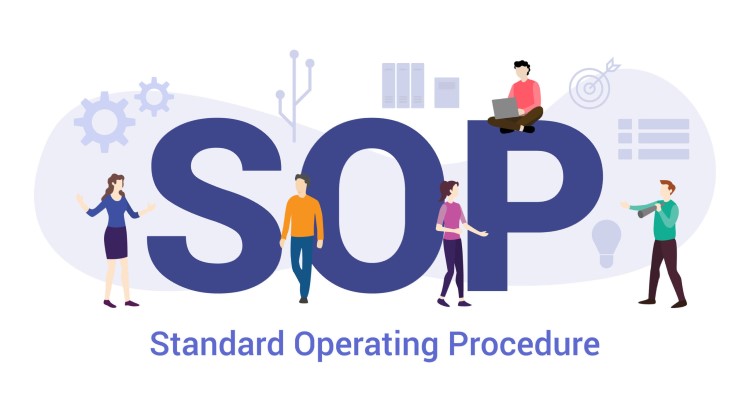
Defining Standard Operating Procedures (SOPs) is crucial for maintaining consistency, efficiency, and quality in any business operation. SOPs provide a detailed outline of the processes employees should follow to ensure tasks are completed in a standardized manner. Whether it’s for routine activities or complex operations, clearly defined SOPs streamline workflows, enhance productivity, and reduce errors. By defining Standard Operating Procedures, companies create a framework that supports growth, improves communication, and ensures that all team members are aligned.
The Importance of Standard Operating Procedures
Standard Operating Procedures serve as the backbone of business operations. They not only create uniformity in task execution but also ensure compliance with industry standards and regulations. A well-documented SOP reduces the possibility of mistakes and helps teams navigate even the most intricate processes with confidence. In industries such as healthcare, manufacturing, and finance, strict adherence to SOPs can be the difference between success and failure. For example, in healthcare, where patient safety is paramount, a misstep in following procedures could result in critical errors. Similarly, in finance, SOPs ensure regulatory compliance and minimize risks associated with improper handling of sensitive data.
Defining Standard Operating Procedures also promotes accountability. With clear guidelines in place, employees know what is expected of them and can measure their performance against established benchmarks. SOPs serve as training tools for new hires and refreshers for seasoned staff, creating a foundation for continuous learning and improvement.
Defining Standard Operating Procedures: Key Steps
Defining Standard Operating Procedures begins with identifying the key processes that require documentation. Businesses must evaluate which tasks are performed regularly, how they impact overall operations, and where there may be room for improvement. In addition to detailing the steps involved, SOPs should address specific roles and responsibilities. Each step must clearly outline who is accountable for completing the task and the expected outcome.
Another important step in defining SOPs is incorporating feedback from employees who execute the tasks regularly. Those who are familiar with the day-to-day operations can provide valuable insights into potential bottlenecks and inefficiencies. Involving these individuals in the process ensures that the SOPs are practical and relevant, increasing their effectiveness.
Once SOPs are documented, they should be reviewed by supervisors or managers to ensure completeness and accuracy. Testing the SOPs by having employees follow them during live operations can reveal any gaps or inconsistencies. After implementation, SOPs should be reviewed periodically to ensure they remain aligned with current business needs and technological advancements.
Benefits of Well-Defined SOPs
Defining Standard Operating Procedures offers a wide range of benefits. First and foremost, they reduce variability in how employees perform tasks. When each employee follows the same set of instructions, there is a higher likelihood of achieving consistent results, which is essential for customer satisfaction and operational excellence.
SOPs also boost efficiency by eliminating the need for employees to figure out how to complete tasks on their own. Instead, they can reference the documented procedures, saving time and reducing errors. This efficiency leads to cost savings because employees spend less time and fewer resources correcting mistakes or misunderstandings.
Furthermore, SOPs enhance training and onboarding efforts. New employees can quickly become familiar with their roles by following established guidelines. This shortens the learning curve and ensures that employees gain the knowledge they need to contribute effectively from the start.
Another key advantage of defining Standard Operating Procedures is that they improve communication within the organization. SOPs clarify roles and responsibilities, reducing ambiguity and promoting collaboration across departments. When everyone understands the processes in place and their respective roles, teams can work together more seamlessly.
The Role of SOPs in Compliance and Risk Management
For businesses in highly regulated industries, defining Standard Operating Procedures is essential for compliance. SOPs ensure that organizations follow local, national, and international regulations by requiring all tasks to align with established guidelines. Compliance with these regulations is critical for avoiding fines, legal penalties, and reputational damage.
SOPs also play a significant role in risk management. By standardizing processes, businesses can identify potential risks and implement preventive measures. SOPs often include contingency plans for handling unexpected situations, ensuring that employees know how to respond when issues arise. This level of preparedness can reduce downtime and prevent minor problems from escalating into major disruptions.
For example, in manufacturing, clearly defined SOPs can prevent workplace accidents by ensuring employees follow safety protocols. In the event of equipment failure or hazardous conditions, an SOP can guide employees through the necessary steps to mitigate harm and report the issue immediately. Similarly, in data-sensitive industries like finance and healthcare, SOPs ensure that employees handle confidential information securely, minimizing the risk of data breaches.
Maintaining and Updating SOPs
Defining Standard Operating Procedures is not a one-time activity. As businesses evolve, so must their processes. It is important to regularly review and update SOPs to reflect changes in technology, organizational structure, or regulations. A failure to keep SOPs current can lead to inefficiencies and non-compliance.
When updating SOPs, businesses should involve employees in the process to ensure the revised procedures are practical and relevant. Additionally, managers should hold training sessions to inform employees of any changes and ensure they fully understand the updated procedures.
Defining Standard Operating Procedures is vital for any business aiming to improve efficiency, compliance, and overall performance. SOPs provide a clear framework that helps employees execute tasks consistently, reduce errors, and align with industry standards. As businesses grow and evolve, regularly reviewing and updating SOPs ensures they remain effective and relevant. Whether for small businesses or large enterprises, clearly defined SOPs are a cornerstone of successful operations, helping teams work together smoothly and achieve common goals.

